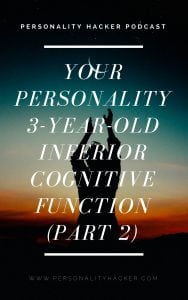Download Episode Here – right click link and select “Save Link As…”
In this episode, Joel and Antonia continue talking about the 3-Year-Old inferior cognitive function for each of the 16 personality types (part 2).
In this podcast you’ll find:
- Part 1 of this two part podcast series
- Aspiration – something that informs the bigger game plans you want to make in the world and requires you to make peace with it.
- Inferior cognitive function – 3 yr old
- Opposite our Driver
- This podcast we are talking about IJs and EPs – types that lead with a Perceiving process.
- Too much time with the inferior can cause depression, but 5-10% is ideal.
-
ESTP – ESFP
- Drive with Extraverted Sensing
- Inferior function is Introverted Intuition – “Perspectives”
- As an aspiration, ESPs use this by looking to help people shift the way they see things.
- To see a more significant principal in life to improve quality of life.
- ESPs may tend to push this away because the future seems scary and unpredictable.
- When ESPs integrate this part it conquers their paranoia. They recognize what is possible.
- Instead of fearing what the future holds, harness action right here and now to project yourself into the future you want.
- ESPs are stereotyped as not very serious. Too playful. No introspection.
- 5-10% – spend a little bit of time every day meditating or journaling.
- Journal about where you are going in the future. What does the future hold?
- Bodybuilding – meditate on the muscle. Focus on it becoming stronger.
- Tiny meditations on the things you are already doing.
-
ISTJ – ISFJ
- Drive with Introverted Sensing
- Inferior function is Extraverted Intuition
- This inferior function shows up as them avoiding anything that is new or out of their comfort zone.
- Locked down routine. Rut.
- There is a part of them that seeks adventure.
- Aspiration: Wanting a life that is not so mundane. Start a new business. Do something creative.
- ISJs like to travel.
- 5-10% doing something a little different a couple of times a week, like trying different types of food.
- Explore outside their comfort zone.
-
ENFP – ENTP
- Drive with Extraverted Intuition
- Inferior function is Introverted Sensing
- Introverted Sensing causes ENPs to fear the mundane or routine and see it as limiting their freedom.
- Si is very in touch with protocols and standards.
- As an aspiration it helps the ENPs see the need to change the standard protocols and improve them.
- It’s good for ENPs to integrate the importance of the institutions.
- Lots of things are built upon these traditional structures, and they need to be honored.
- The question is, How do we make everything better?
- 5-10% Accept reality as it is. Be more patient. Things can’t change overnight.
- Journaling is very powerful for people who have an introverted inferior function.
- Accept certain situations in life for what they are. Just because they aren’t optimal for you doesn’t mean they are not optimal for someone else.
- Routinize basic things in life, like a 5 step morning routine.
-
INTJ – INFJ
- The driver is Introverted Intuition
- The inferior process is Extraverted Sensation
- Aspiration is a tendency toward mind-body connection with an emphasis to body: massage, yoga, martial arts, training, etc.
- INJs may tend to neglect their bodies due to the Se blind spot.
- They may struggle with eating the right foods and getting the exercise they need.
- INJs sometimes struggle with reading body language because that is a strength for Extraverted Sensing.
- NLP – neuro linguistic programming – encourages reading body language.
- Understand the mind better by making the body a better instrument through exercise and nutrition.
- 5-10% would be getting a little bit of exercise every day.
- The inferior may feel scary or icky, but there is a lot of power in this part of you.
- Your aspiration lives in this part of you. It helps you answer what your purpose is.
To subscribe to the podcast, please use the links below:
Subscribe with iTunes
Non-iTunes Link
Download The Android App
Subscribe on Soundcloud
Subscribe with Stitcher
Subscribe on Google Play
Subscribe with Facebook Messenger
If you like the podcast and want to help us out in return, please leave an honest rating and review on iTunes by clicking here. It will help the show and its ranking in iTunes immensely! We would be eternally grateful!
Want to learn more?
Discover Your Personal Genius
We want to hear from you. Leave your comments below…



Share:
Podcast - Episode 0198 - Your Personality 3-Year-Old Inferior Cognitive Function (Part 1)
Podcast - Episode 0200 - Zero To One And The Future Of Personality Hacker
12 comments
Can you guys please do a podcast on INTJ females?
I’m an INFJ with Se 3 yo. In my early-mid twenties, I was very focused on my health and weight. I was overweight until that point, but became obsessed to the point that some were concerned it was becoming a disorder since I had lost so much weight and I was so focused on my health. I suspect I was in an Se grip and and not really integrating my Se. In my late twenties I began the parenting journey through foster care. The last 10 years have been traumatic ones as a result and now I really struggle with caring for my body. I just don’t seem to have the motivation. Is it possible to integrate your 3 yo function, then lose it? I’m trying to find a strategy that will be motivating for me that doesn’t become an unhealthy obsession.
Thanks for such an informative podcast!
As an ENFP I listened to this podcast with great interest, because I knew Joel and Antonia as ENxPs, would hit the nail on the head for Si. I really liked what Joel said about fostering a little routine everyday. I’ve found that it has been really hard for me to keep routines, since I strongly resist being “tied down” to anything, yet when I don’t, my daily life descends into chaos. But over the years, even developing the simple habits like washing dishes right after I eat, cleaning the whole apartment once a week and doing the laundry once a week (same day every week) makes a huge difference and actually makes me more free. I’m not there yet, but I really need to establish more daily routines and systems that set things I need to do in place so I don’t actually have to think about it. 80% of my stress comes from thinking about all the shit that needs to routinely get done ? some of the stuff I want to do is: make a bunch of food one day a week so I don’t need to worry about all meals during the week; practice music everyday; clean my car once a week; set the coffee maker at night so it makes coffee in the morning; tidy up my desk every day; call my parents every week; go to bed earlier every night so I can get up early (this one is tough) etc etc. These things sound extremely simple and easy to do but why are they hard for an ENFP? Lol. I’d love to hear how other inferior Si users deal with rountines and organization, and see some resources for developing habits and routines! Thanks Joel and Antonia for providing this platform!!
I have recently discovered your website after many years of only having had a superficial understanding of my INFJ personality type. The information on the cognitive stack is intriguing and I am completely absorbed! I have listened to a few podcasts now out of order. After listening to this one, I just have to say you are spot on with your description of how the three year old “sensation” process, when integrated, can truly benefit the INFJ.
I’ve had a complex relationship with my body my entire life. I intuitively understand the mind-body connection, knowing I need physical exercise for mental clarity. As a former runner, I would enter a meditative state while running that would free me from thought and allow me to face the day with more focus. I’ve discovered the benefits of yoga as I’ve gotten older. One of my favorite things about it is the permission I feel to be playful. I’m 41 years old and am doing handstands like I did in gymnastics class as a child. It’s fantastic! In the past when I would get too busy or stressed and didn’t engage in any form of exercise for several days, negative behaviors would start to emerge, mindless eating being the main one. I’d end up feeling uncomfortable in my body and unable to show up in the way the world needed me. This still happens sometimes but I’m much more aware of why it is happening and try instead to soothe myself with movement, nature, or music. Anything that will keep me feeling healthy in my body rather than sabotaging it with foods that are not good for my system.
Thank you for this podcast. I completely recognized my 3 year old self and will give it the 5 to 10% attention it needs daily. :)
As an ENFP, I can definitely relate to the feeling of wanting to torch systems and start over from scratch. I know deep down it’s impractical and would end up hurting more people than it ever could help. But that inner gut reaction is still there. I suppose I have a vision, and I want to be able to implement it 100% fully now even if I’m not even sure what that vision entails.
I personally try to foster Si by taking time to revisit something familiar. I’ll read a favorite book or watch an episode of my favorite TV show. Or I’ll try to reflect on what I could have done to make something better or the things I have consistently done right (though the latter I can’t seen to identify, I just sort of do things).
I find that talking to and interacting with ISJs also really helps me conceptualize that Si isn’t all this uncomfortable thing. This works especially well with ISTJs (ISFJs are a bit harder as sometimes I am completely baffled by Fe-in a good way most of the time). I find the admirable parts of their personality that are connected to Si. I can then use that to see Si as something helpful by using Ne to make connections between Si and the individual’s positive qualities.
For me, I suppose, seeing examples of strong, well-developed Si and the things Si doms have achieved or their positive qualities helps me to see the value in that part of myself.